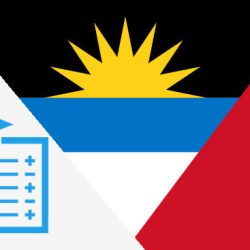(Adopted on:5 November,2004)
An Act to provide for the establishment of an Integrity Commission for the purpose of receiving declarations of the affairs of persons holding specific positions in public life, for the purpose of establishing probity, integrity and accountability in public life and for related matters.
Part I Preliminary
1. This Act may be cited as the Integrity in Public Life Act, 2004 and shall come into operation on such day as the Minister may by Notice published in the Gazette appoint.
2. In this Act unless the context otherwise requires —
“assets” include all property including monies beneficially held whether in or out of Antigua and Barbuda;
“Commission” means the Integrity Commission established pursuant to section 4;
“document” includes, in addition to a document in writing —
Short title and commencement.
Interpretation.
(a) any map, plan, graph or drawing;
(b) any photograph;
(c) any disc, tape sound track or other device in which sounds or other data not being visual images are embodied so as to be capable, with or without the aid of some other equipment, of being reproduced therefrom;
(d) any film, including microfilm, negative, tape or other device in which one or more usual images are embodied so as to be capable, with or without the aid of some other equipment, of being reproduced therefrom,
“income” includes —
(a) money derived from whatever source or acquired in or out of Antigua and Barbuda;
(b) all receipts by way of salary, fees, wages, requisitions, profits, grants, emoluments, rents, interests, commissions, bonus, pensions or annuity and all income within the meaning of the Income Tax Act;
“liability” includes all obligations to pay or to transfer money to another whether in or out of Antigua and Barbuda;
“Minister” means the Minister responsible for Justice and Legal Affairs;
“public function” means any activity performed, whether or not payment is received therefore, which is carried out by —
(a) a person for, or on behalf of or under the direction of a Ministry, Department of Government or a body enacted by statute or an authority;
(b) a body whether public or private, providing public services;
(c) a member of the Senate or the House of Representatives;
“person in public life” means a person referred to in the First Schedule;
“property” includes money and all property, real or personal and things in action;
“spouse” in relation to a person in public life means a person to whom the person in public life is married or who is living with that person in the circumstances of husband and wife for a period of three years but does not include —
(a) a married spouse who is living separate and apart from the person in public life;
(b) a married spouse who has ceased to live with that person and where proceedings have been instituted for a divorce or judicial separation during the period a declaration is required to be filed.
“statutory body” means a corporation, company, board, commission, authority or other body established by or under any written law to perform public functions on behalf of the Government.
3. This Act applies to every person in public life.
Part II Integrity Commission
4. (1) There is hereby established an Integrity Commission.
(2) The Commission shall consist of a chairman and two other members.
(3) The members of the Commission shall be appointed by the Governor-General acting in his own discretion.
(4) The members of the Commission shall be persons of integrity one of whom is a lawyer who has practiced law in the Commonwealth for no less than ten years and one of whom is a Application of the Act.
Establishment of Integrity Commission.Public accountant entitled, under the Accountancy Profession Act, 1992, to practise as such and who has so practised for no less than ten years.
(5) A member shall, before assuming the functions of his office, make and subscribe the oath of office and the oath of secrecy in Form 1 in the Third Schedule before the Governor-General.
5. A person shall not be appointed a member of the Commission if he —
(a) is a member of the House of Representatives or the Senate;
(b) is a person in public life other than as a member of the Commission;
(c) has, at any time during the three years preceding his appointment, been a public officer;
(d) has at any time during the five years preceding his appointment held office in a political party; or
(e) would otherwise be disqualified to be a member of the House of Representatives or the Senate.
6. A member of the Commission shall hold office for a period not exceeding three years and shall be eligible for re-appointment.
7. (1) A member other than the Chairman may at any time resign his office by instrument in writing addressed to the Governor-General and transmitted through the Chairman and from the date specified in the instrument of resignation that person ceases to be a member.
(2) The Chairman may at any time resign his office by instrument in writing addressed to the Governor-General and from the date specified in the instrument of resignation that person ceases to be Chairman and member of the Commission.
8. A member of the Commission shall vacate office —
(a) at the expiration of the term of his appointment;
Tenure of office.
Resignation of members.
Vacation of office.
Disqualification from membership. Act No. 10 of 1992.
(b) on the absence of the member from three consecutive meetings of the Commission, unless the absence is approved by the Governor-General;
(c) if the member with his consent is nominated for election to the House of Representatives or is appointed a Senator;
(d) if the member is appointed to any public office; or
(e) on his resignation or removal from office.
9. (1) A member of the Commission may be removed from office only for inability to exercise the functions of his office whether arising from infirmity of body or mind or any other cause or for misbehaviour and shall not be so removed except in accordance with the provisions of this section.
(2)A member of the Commission shall be removed from office by the Governor-General if the question of his removal has been referred to a tribunal appointed under subsection (3) and the tribunal has recommended to the Governor-General that he ought to be removed from office for inability as aforesaid or for misbehaviour.
(3) If the Governor-General considers that the question of removing a member of the Commission ought to be investigated—
(a) the Governor-General shall appoint a tribunal which shall consist of one person being a Judge of the High Court, a Senior Counsel or a Chief Magistrate, to enquire into the matter and report on the facts thereof to the Governor-General and recommend to him whether the member of the Commission ought to be removed under this section; and
(b)a tribunal appointed under paragraph (a), shall give the member of the Commission an opportunity to show cause why he should not be removed from office.
(4) If the question of removing a member of the Commission has been referred to a tribunal under this section, the Governor- Removal from office.
General may suspend the member from the exercise of the functions of his office and any such suspension may at any time be revoked by the Governor-General acting as aforesaid, and shall in any case cease to have effect if the tribunal recommends to the Governor- General that the member of the Commission should not be removed.
(5) In this section “misbehaviour” includes communicating confidential information to any unauthorized person.
10. The appointment, resignation, revocation of appointment or death of a member of the Commission shall be published in the Gazette.
11. The members of the Commission shall receive such remuneration as shall be determined by resolution of the House of Representatives.
12. (1) The functions of the Commission shall be —
(a) to receive and retain all declarations filed with it under this Act;
(b)to receive and investigate complaints regarding noncompliance with or contravention of any provisions of this Act or the Prevention of Corruption Act, 2004;
(c)to make inquiries as it considers necessary in order to verify or determine the accuracy of a declaration filed under this Act;
(d) to conduct an investigation into any offence of corruption under the Prevention of Corruption Act, 2003 if it is satisfied that there are grounds for an investigation;
(e)to examine the practices and procedures of Statutory Corporations and Departments of Government to determine whether there are corrupt practices;
(f) to advise Statutory Corporations and Departments of Government of any change in practice or procedure which may be necessary to eliminate corrupt practices;
(g) to perform such other functions as is required by this Act.
(2) In the performance of its functions the Commission and the staff of the Commission shall not be subject to the control or direction of any other person or authority.
13. (1)The Commission shall have the same powers, rights and privileges as a commission of inquiry appointed under the Commissions of Inquiry Act.
(2)The Commission shall meet at such times as may be convenient for the transaction of its business.
(3) The proceedings of the Commission shall not be affected by any defect in the appointment of a member or any vacancy in its membership.
(4) Subject to this Act, the Commission shall make rules governing its procedure.
14. The declarations filed with the Commission and the records of the Commission in respect of these declarations are secret and confidential and shall not be made public, except where a particular declaration or record is required to be produced by Order of Court for the purpose of, or in connection with any court proceedings or enquiry in respect of a declaration under this Act, the Prevention of Corruption Act, 2004 or the Perjury Act.
15. (1) Every member of the Commission and every person performing any function in the service of the Commission shall treat all declarations, records or information relating to such declarations as secret and confidential and shall not disclose or communicate same to any unauthorised person or allow any such person to have access to any such records, information or declaration.
(2) A person who contravenes subsection (1) commits an offence and is liable on summary conviction to a fine of twenty five thousand dollars or three years imprisonment or to both such fine and imprisonment.
(3) An unauthorised person is a person other than a person authorised to receive information —
(a) under this Act in relation to the financial affairs of persons in public life; or
(b) by reason of an Order of a Judge of the High Court.
(4) Where an unauthorised person publishes information which is submitted by a person in public life pursuant to Part III of this Act he commits an offence and is liable on summary conviction to a fine of twenty five thousand dollars or three years imprisonment or to both such fine and imprisonment.
Part III Disclosure of Affairs
16. (1) Every person in public life shall file a declaration in Form 2 in the Third Schedule with the Commission setting out —
(a) his income, assets and liabilities;
(b) his public and private offices;
(c) the assets of his children above eighteen years old and of any relative which were acquired partly or fully with his income;
(d) the assets of his or her spouse and of their children below eighteen years old;
(e) any gifts received in the course of the performance of his public functions; and
(f) such other information required to be set out in Form 2 in the Third Schedule.
(2) The Commission shall examine every declaration filed to ensure that it is in compliance with this Act.
(3)Where the Commission upon examination of a declaration filed pursuant to subsection (1) is of the opinion that it is necessary or expedient to request further information in order to determine the accuracy of a declaration, the Commission may request the person in public life to furnish any other documents or information as may be required within a specified period.
(4)Where upon an examination under subsection (2) the Commission is satisfied that a declaration has been fully made it shall issue a certificate in Form 3 in the Third Schedule.
17. (1) A person who is a person in public life on the date of commencement of this Act shall within three months from the date of commencement file a declaration pursuant to section 16 and thereafter on or before the 31st day of March in each year during any part of which he remains a person in public life.
(2) A person who becomes a person in public life after the commencement of this Act shall file a declaration pursuant to section 16 within three months of his becoming a person in public life and thereafter on or before the 31st day of March in each year during which he remains a person in public life.
(3) Where a person ceases to be a person in public life he shall furnish a declaration at the end of six months from the date on which he so ceases.
(4) Where a person in public life dies, the declaration which he would have been required to file had he lived shall not be filed.
(5) Every member of the Commission shall file a declaration in Form 2 in the Third Schedule with the Governor-General before he assumes office and thereafter on or before the 31st day of March of each year.
(6) The Governor-General shall appoint an auditor to examine and verify the accuracy of a declaration filed under this section and the auditor shall submit a report to the Governor-General.
18. (1) Where a person in public life holds property in trust for another person he shall so state in his declaration but shall not be required to disclose the terms of the trust.
(2) A person in public life who has assets in a blind trust shall file a copy of the trust deed with the Commission.
(3) Where the assets of a person in public life are in a blind trust he does not have to give more particulars in his declaration than the amount and description of those assets placed in that trust and the date the trust was created.
(4) A blind trust is created where a person in public life enters into an agreement with a qualified trust company whereby —
(a) after he ceases to be a person in public life full and proper accounting will be made to him regarding the management of the trust;
(b) all or part of his assets are conveyed to the trust for its administration, control and management in its absolute discretion without recourse or reporting to the persons beneficially entitled to those assets; and
(c) conversion of the assets into other assets are not to be communicated to him until he ceases to be a person in public life.
(5) A trust company is a qualified trust company where —
(a) no more than ten percent of the issued shares in the trust company or any of its affiliates is held by the person in public life entering into an agreement with it or by an associate, and
(b) the person in public life holds no directorship or office in the trust company or any of its affiliates.
(6) For the purposes of this section reference to a spouse includes a single person who was living together with a single person of the opposite sex or of the same sex as his or her spouse for a period of not less than five years.
(7) For the purposes of subsection (7) a reference to a single person includes a reference to a widow or widower or to a person who is divorced.
(8) For the purpose of this section a company is an affiliate of another company where the first mentioned company holds more than five percent of the issued shares in the second mentioned company or where the second mentioned company holds more than ten percent of the issued shares in the first mentioned company.
(9) For the purpose of subsection (4) “control” shall be construed within the meaning of “controlled company” as Cap. 212 provided for in the Income Tax Act.
(10) A person in public life who fails to comply with subsection
(1) commits an offence and is liable on summary conviction to a fine not exceeding five thousand dollars or to a term of imprisonment not exceeding six months.
19. For the purposes of a declaration pursuant to section 16 the income, assets and liabilities of a person in public life include the income, assets and liabilities acquired held or incurred by any other person as his agent or on his behalf.
20. (1) Where a person who is required to file a declaration under section 16 fails to file a declaration, the Commission shall publish that fact in the Gazette and send a report, for appropriate action —
(a) in the case of the President of the Senate and of the Speaker of the House of Representatives, to the Governor-General;
(b) in the case of a Senator, to the President of the Senate;
(c) in the case of a Member of the House of Representatives, to the Speaker of the House of Representatives;
(d) in the case of a person appointed by a Service Commission, to the relevant Service Commission; or
(e) in the case of a person appointed holding office in a statutory body, to the person or authority having power to make an appointment to that office.
(2) Where criminal proceedings are instituted against a person in public life under this Act no disciplinary proceedings shall be instituted pending the determination of the criminal proceedings.
(3) A person in public life who, without reasonable cause, fails to make a declaration as required by section 16 shall, by reason of that failure, vacate all offices in public life held by him and the Commission may order that he be disqualified from holding any office in public life for such period as the Commission may determine. Income, assets and liabilities of agent. Failure to file declaration.
Part IV Code of Conduct
21. (1) Every person in public life shall observe the Code of Conduct specified in the Second Schedule.
(2) A person in public life who is in breach of the Code of Conduct commits an offence and is liable on summary conviction, to a fine of fifty thousand dollars or to three years imprisonment or to both such fine and imprisonment.
22. (1) A person who has reasonable grounds to believe that any person in public life is in breach of any provision of the Code of Conduct may make a complaint in writing to the Commission and shall state in the complaint the particulars of the breach including —
(a) the period within which the breach was committed;
(b) the names and addresses of persons involved in the commission of the breach.
(2) A person making a complaint under subsection (1) shall produce to the Commission —
(a) evidence to support the complaint including documentary evidence and sworn statements;
(b) such other particulars as may be prescribed by Regulations.
(3) A person who makes a complaint under this section shall not be liable in civil or criminal proceedings unless it is proved that the complaint was not made in good faith.
23. Where a complaint has been made to the Commission under section 22, the Commission after examining the complaint may reject the complaint if the Commission is of the opinion that —
(a) the complaint is frivolous or vexatious;
(b) it does not pertain to a matter the Commission is empowered to deal with under this Act:
Provided that no complaint shall be rejected by the Commission without giving the person who made the complaint a reasonable opportunity of being heard.
24.(1)Where upon examination of a complaint made under section 22, the Commission is of the view that an investigation is necessary, it shall inquire into the matter.
(2) In conducting an inquiry under this section the Commission shall have the same powers to summon witnesses as a commission of inquiry under the Commissions of Inquiry Act.
(3) The sittings of the Commission to take evidence or hear submissions in the course of any inquiry under subsection (1) shall be held in camera.
(4) The complainant and the person in public life against whom any inquiry is held under this section are entitled to notice of the proceedings of the inquiry and to be represented at the inquiry either personally or by an Attorney-at-Law.
25. (1) On conclusion of an inquiry under section 24, the Commission shall forward the report to the Governor-General, and if it is of the opinion that the evidence before it may warrant that the Director of public Prosecution take action against the person the Commission shall forward a copy of the report to him.
(2) Where the Commission has forwarded to the Director of Public Prosecutions a report under subsection (1), the Director of Public Prosecutions shall inform the Commission and the Governor-General, in writing about the action taken in pursuance of the report and any other relevant evidence.
Part V Gifts
26. (1) A person in public life shall not accept any gift or reward from any person as —
(a) an inducement for any official act to be done by him; or
(b) a reward for any official act done by him.
(2) Notwithstanding subsection (1), a person in public life may accept a gift or reward from —
(a) a community organization on a social occasion which represents the creativity of that organization; or
(b) a foreign dignitary where the person in public life has reasonable grounds to believe that the refusal to accept it may offend the foreign dignitary.
(3) Where a person in public life accepts a gift or reward in the circumstances specified in paragraph (b) of subsection (2), he shall make a report of that fact in Form 4 in the Third Schedule to the Commission within seven days of the receipt of the gift.
(4) Where the Commission determines that the gift was given to the person in public life as a personal gift and was not intended to be a motive or reward for doing or abstaining from doing anything in the course of the performance of his official functions or causing any other person from doing or forbearing to do anything, the Commission shall allow the person in public life to retain the gift.
(5) Where the Commission finds through the inquiry that the gift was given to the person in public life —
(a) as a State gift; or
(b) personally, but was intended to be a motive or reward for doing or abstaining from doing anything in the course of the performance of his official functions or causing any other person from doing or forbearing to do anything, the Commission shall direct the person in public life in writing to deliver the gift to the Financial Secretary on behalf of the State within such period not exceeding fourteen days as may be specified by the Commission, and the person in public life shall comply with the direction within the time so specified.
(6) Where a gift is delivered to the Financial Secretary pursuant to subsection (4) it shall be dealt with as a gift to the State.
(7) Any person in public life who fails to comply with the direction given by the Commission under subsection (5) commits an offence and is liable on conviction to a fine equal to the value of the gift involved or ten thousand dollars, whichever is greater or to a term of imprisonment not exceeding twelve months.
PART VI Miscellaneous
27. The funds of the Commission shall consist of such funds as may be appropriated to the Commission by Parliament.
28. The Commission shall keep proper accounts of all sums appropriated, its assets and liabilities and those accounts shall be audited annually by the Director of Audit or an auditor appointed by the Governor-General.
29. (1) The Commission shall prepare and submit to the Minister on or before June 30th in each year a report on the activities of the Commission during the preceding year and its audited accounts.
(2) A copy of the report together with the auditor’s report shall be laid before the House of Representatives at the sitting following the receipt of the report.
(3) The report under subsection (1) shall not disclose the particulars of any declaration filed with the Commission.
30. (1) The Governor-General shall appoint a Secretary to the Commission on such terms and conditions as he may determine.
(2) The Secretary shall —
(a) be entitled to attend meetings of the Commission;
(b) record the minutes of each meeting; and
(c) subject to the direction of the Commission, perform all functions necessary for the efficient and effective discharge of the functions of the Commission.
(3) The Commission shall be provided with staff adequate for the prompt and efficient discharge of its functions under this Act.
(4) The staff of the Commission shall be public officers appointed by the Public Service Commission.
(5) Every person appointed under this section or authorized to perform any functions under this Act shall, before assuming his functions, make and subscribe the oath of office and the oath of secrecy in Form 1 in the Third Schedule before the Chairman.
31. All expenses incurred by the Commission for the purposes of this Act are a charge of the on the Consolidated Fund.
32. (1) A person who —
(a) fails without reasonable cause to furnish to the Commission a declaration or further particulars thereof which he is required to furnish in accordance with this Act; or
(b) knowingly makes a declaration which is false in some material particular, commits an offence and is liable on summary conviction to a fine of fifty thousand dollars or to imprisonment for a term of three years or to both such fine and imprisonment.
(2) Where the offence under subsection (1) involves the nondisclosure of property acquired while in public life, the Court may, if satisfied that such property was acquired in contravention of this Act or any other law, in addition to the penalty specified under subsection (1) —
(a) where the property involved is situated in Antigua and Barbuda declare that it be forfeited to the State; or
(b) where the property involved is situated outside Antigua and Barbuda, order that an amount equivalent to the value of the property as assessed by the Court be paid by the person in public life to the State.
(3) Property acquired from a person referred to under subsection (2) by a bona fide purchaser for value without notice of any offence by that person is not liable to forfeiture, but the Court may order that an amount equivalent to the value of the property or the price paid by the purchaser, whichever is the greater, shall be paid by the person in public life to the State.
First Schedule Persons In Public Life
1. Member of the Commission and the Secretary to the Commission
2. Members of the House of Representatives
3. Members of the Senate
4. President of the Senate
5. Speaker of the House of Representatives
6. Parliamentary Secretaries
7. Secretary to the Cabinet
8. Members of the Barbuda Council
9. Members of the Electoral Commission
10 . Financial Secretary and Deputy Financial Secretary
11. Budget Director and Deputy Budget Director
12. Permanent Secretaries, Principal Assistant Secretaries and Assistant Secretaries
13. Heads and Deputy Heads of Diplomatic Missions
14. Solicitor General
15. Clerk to Parliament
(4) Payment of all sums due to the State pursuant to subsection
(2) or (3) may be recovered as a debt due to the State.
33. The Minister may, by Order which shall be subject to affirmative resolution of the House of Representatives, amend any of the Schedules.
34. Subject to this Act and to Regulations made hereunder the Commission may make rules to regulate its procedure.
35. The Minister may make Regulations with respect to —
(a) any matter that is required to be prescribed by Regulation under this Act; and
(b) generally, for the effective implementation of this Act.
16. Chief Establishment Officer
17. Accountant General and Deputy Accountant General
18. Managers, Heads and Deputy Heads of Departments and Divisions
19. Commander and Deputy Commander of the Defence Force
20. Commissioner and Deputy Commissioner of the Police Force
21. Police Officers of the rank of Inspector and above
22. Chief Immigration Officer, Deputy Chief Immigration Officer and all other Immigration Officers
23. Superintendent of Prison
24. All commissioned and warrant officers of the Antigua and Barbuda Defence Force
25. Comptroller of Customs and all Customs Officers
26. Commissioner of Inland Revenue and all Inland Revenue Officers
27. Legal Officers employed by the Government of Antigua and Barbuda
28. Director of Public Prosecutions
29. Magistrates
30. Labour Commissioner and Deputy Labour Commissioner
31. Chief Technical Officers of Ministries
32. Members of the Public Service Commission
33. Members of the Police Service Commission
34. Member of the Public Service Board of Appeal
35. Members of the Boards or governing bodies of statutory bodies
36. Chief Executives and deputy chief executives, by whatever name known, of statutory bodies
37. Heads and Deputy Heads of Divisions of statutory bodies
38. Members of the Tenders Board
39. All Public Officers including non-established officers receiving a salary in excess of $4,000.00 per month
Second Schedule Code of Conduct
A person in public life shall not —
(a) in return for anything done, or to be done, or omitted to be done in the execution of his duties, ask for or accept for himself or any person, any money, property benefits or favours of any kind over and above that which he is lawfully entitled to receive for the performance of his duties;
(b) in the course of the performance of his official functions discriminate against any person with respect to terms, conditions and privileges of employment or other official matters because of that person’s race, place of origin, political opinion, colour, creed or gender;
(c) for himself or for anyone else accept any gifts, benefit or advantage from any one, except personal gifts from his spouse, relatives or friends, or personal gifts given otherwise than as a motive or reward for doing or forbearing to do anything in the performance of his official functions or causing any other person from doing or forbearing to do anything; but this paragraph does not apply to gifts received on behalf of the State by a person in public life in the course of the performance of his official functions;
(d) allow private interests to conflict with his public duties or improperly influence his conduct in the performance of his public duties;
(e) allow the pursuit of his private interest to interfere with the proper discharge of his public duties; and any conflict between his private interests and his public duties shall be resolved in favour of his public duties;
(f) use his official influence in support of any scheme or in furtherance of any contract or proposed contract or other matter in regard to which he has an interest;
(g) for his personal advantage, benefit or gain, make use of, or communicate to anyone except in the performance of his official duties, the contents of any document, or any information, or matter required in the course of his official duties which are not available to the public;
(h) use or allow the use of public property (including money), equipment, supplies or services for any purpose other than for officially approved purposes;












 We will not leak your personal information
We will not leak your personal information